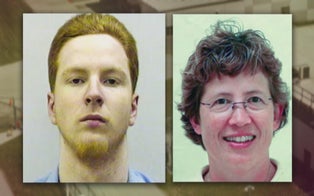Ari Mahler took to social media to recount the experience of tending to Bowers in a Facebook post that, as of Monday, had been shared more than 140,000 times.
The Jewish nurse who treated Robert Bowers after he allegedly opened fire at a Pittsburgh synagogue, killing 11 and injuring seven, said he acted upon love and professionalism.
Ari Mahler took to social media to recount the experience of tending to Bowers in a Facebook post that, as of Monday, had been shared more than 140,000 times.
His post came after countless media outlets had reported on a Jewish medical professional treating the man accused of perpetrating what is believed to be the deadliest attack on Jews in American history. Bowers has pleaded not guilty. He faces 44 counts of murder, hate crimes, obstructing religious practices and other crimes. Prosecutors are seeking the death penalty.
“I am The Jewish Nurse,” Mahler began his Facebook post. “Yes, that Jewish Nurse … the trauma nurse in the ER that cared for Robert Bowers who yelled, ‘Death to all Jews,’ as he was wheeled into the hospital. The Jewish nurse who ran into a room to save his life.”
Though Mahler said he couldn’t provide specific details of his interactions with Bowers because of privacy laws, he noted he “didn’t see evil when I looked into Robert Bowers’ eyes. I saw something else.”
“I can tell you that as his nurse, or anyone's nurse, my care is given through kindness, my actions are measured with empathy, and regardless of the person you may be when you're not in my care, each breath you take is more beautiful than the last when you're lying on my stretcher,” Mahler wrote. “This was the same Robert Bowers that just committed mass homicide. The Robert Bowers who instilled panic in my heart worrying my parents were two of his 11 victims less than an hour before his arrival.”
Bowers thanked Mahler for treating him, Mahler wrote, noting he chose to not share with his patient that he himself shares the same faith as the 11 people he is accused of killing.
“I’m sure he had no idea I was Jewish,” he wrote. “Why thank a Jewish nurse, when 15 minutes beforehand, you’d shoot me in the head with no remorse? I didn’t say a word to him about my religion. I chose not to say anything to him the entire time. I wanted him to feel compassion. I chose to show him empathy. I felt that the best way to honor his victims was for a Jew to prove him wrong. Besides, if he finds out I’m Jewish, does it really matter? The better question is, what does it mean to you?”
Mahler noted he has long experienced anti-Semitism, recalling being singled out for his religion and for being the son of a rabbi when he was a child.
“I found drawings on desks of my family being marched into gas chambers, swastikas drawn on my locker, and notes shoved inside of it saying, ‘Die Jew. Love, Hitler,’” he wrote.
Being labeled “the Jewish” person was never positive, Mahler wrote, noting even as an adult he instinctively deflected away from the label.
“That's why it feels so awkward to me that people suddenly look at it as an endearing term,” he wrote. “As an adult, deflecting my religion by saying ‘I’m not that religious,’ makes it easier for people to accept I’m Jewish – especially when I tell them my father is a rabbi. ‘I’m not that religious,’ is like saying, ‘Don’t worry, I’m not that Jewish, therefore, I’m not so different than you,’ and like clockwork, people don’t look at me as awkwardly as they did a few seconds beforehand.”
It’s for those reasons that news of a shooting at the Tree of Life synagogue didn’t come as a serious surprise to Mahler, who wrote “it’s only a matter of time before the next one happens.
“History refutes hope that things will change,” Mahler continued. “My heart yearns for change, but today's climate doesn't foster nurturing, tolerance, or civility. Even before this shooting took place, there’s no real evidence supporting otherwise. The FBI and the Southern Poverty Law Center note that Jews only account for two percent of the U.S. population, yet 60 percent of all religious hate crimes are committed against them.
“I don’t know why people hate us so much, but the underbelly of anti-Semitism seems to be thriving,” Mahler wrote.
In concluding his post, Mahler addressed what many may be wondering, which is why he would treat someone who would allegedly wish him dead.
“Love,” he wrote. “That’s why I did it. Love as an action is more powerful than words, and love in the face of evil gives others hope. It demonstrates humanity. It reaffirms why we’re all here.
“The meaning of life is to give meaning to life, and love is the ultimate force that connects all living beings,” he continued. “I could care less what Robert Bowers thinks, but you, the person reading this, love is the only message I wish instill in you. If my actions mean anything, love means everything.”
RELATED STORIES





